mecom attends EENA Conference in Valencia (Spain)
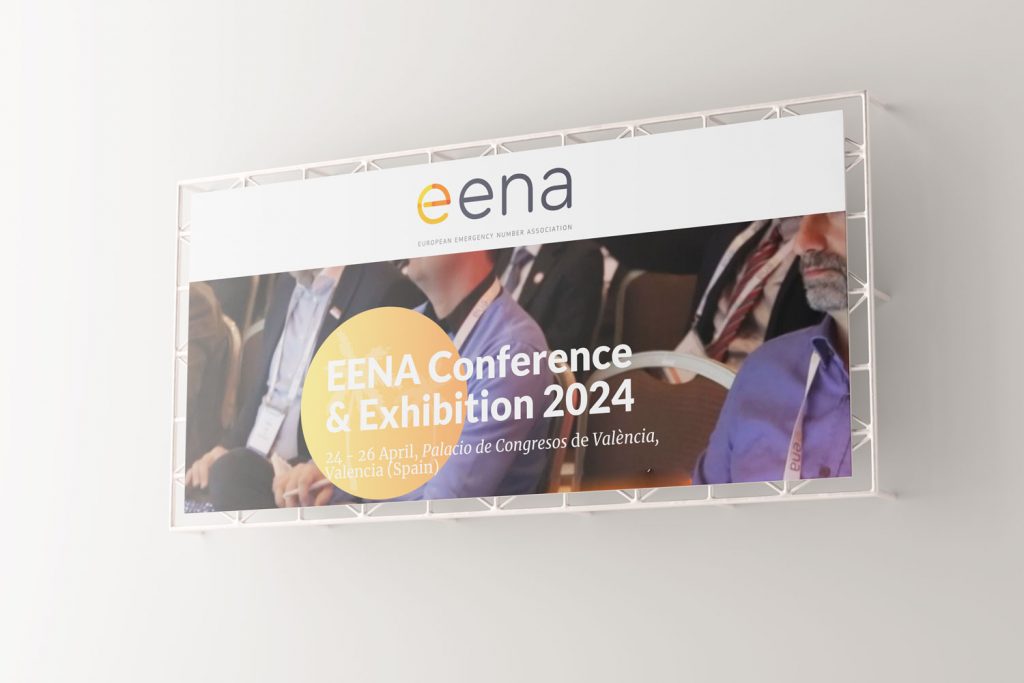
From April 24 to 26, 2024 the EENA Conference & Exhibition 2024 takes place in Valencia. We will attend for the first time.
One year of Cell Broadcast in Germany: 219 disaster alerts were transmitted through smartphones
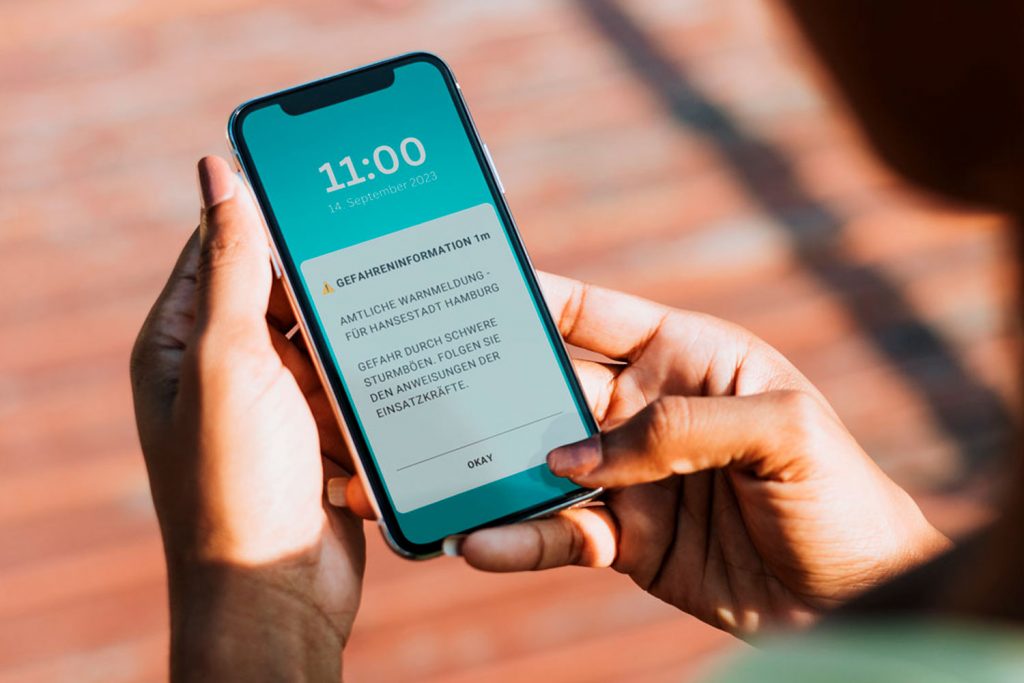
Hamburg. Storms, fires, floods: over the last year, the German population was alerted to hazards via Cell Broadcast 219 times. For one year, Cell Broadcast has now been in use as part of the alerting infrastructure of the Federal Republic of Germany. It was introduced nationwide on 23 February 2023 to enable alerting people to disasters directly through their smartphones. “From our perspective, Cell Broadcast is a complete success,” states mecom’s Managing Director Alexander Feldmann. “As part of the Modular Warning (MoWaS), which we were commissioned to develop by the Federal Office of Civil Protection and Disaster Assistance (BBK) and are operating for the Federal Republic of Germany, Cell Broadcast serves an important purpose. Through this alerting channel, we can reach a great number of people directly.” “Closely collaborating with public authorities and telecom providers, we were able to introduce Cell Broadcast a year ago. It has been an additional relevant channel for the distribution of alerts in Germany ever since,” adds mecom Managing Director Mandy Best. Largest number of Cell Broadcast alerts in North Rhine-Westphalia Since it was introduced one year ago, Cell Broadcast has been triggered roughly once every one and a half days. Smartphone users in North Rhine-Westphalia received most alerts via Cell Broadcast, with cell phones in Germany’s most populous federal state ringing 59 times. The second highest number of Cell Broadcast alerts – a total of 32 – were transmitted in Rhineland-Palatinate, with Bavaria coming in third with 25 uses of the warning system over the past twelve months. Cell Broadcast has not been used at all so far in the city state of Bremen, while in both Mecklenburg-Western Pomerania and Saxony-Anhalt, the new technology has only been triggered once since its introduction a year ago. Fires most common reason for Cell Broadcast alerts The reasons for triggering alerts via Cell Broadcast are very diverse. Be it the recovery of a bomb from the 2nd World War, forest fires, a failure of the emergency call number, power outages, floods or extreme black ice hazards – in cases of acute danger, the public authorities can alert citizens by sending a message directly to their cell phones. Over the past year, the most common reason for Cell Broadcast alerts was fires. Alerts were triggered 101 times for this reason. This means that almost every second alert, 45 per cent, was caused by fires. The second most common reason for triggering Cell Broadcast alerts were natural hazards and weather events such as floods and heavy thunderstorms (18 per cent). But Cell Broadcast alerts were also used to inform citizens about bomb findings and major events that could jeopardise public safety. Over the previous year, twelve per cent of all alerts were due to these topics. Most alerts issued in June and July The months with by far the most Cell Broadcast alerts in Germany were June and July 2023. 37 alerts were issued in June and 29 in July. The technology was used 24 times in August 2023 and 23 times in May. How Cell Broadcast works In hazardous situations, Cell Broadcast can be used by the fire brigade, the police and disaster protection services. The federal government may use it for civil defence purposes. Alerts can be transmitted directly and specifically to the smartphones of many users. Cell Broadcast is one of many alerting channels that are controlled by the Modular Warning System (MoWaS). MoWaS transmits alerts to numerous connected alerting devices such as TV, radio, alerting apps, digital city billboards, passenger information systems – or cell phones via Cell Broadcast. In the event of a hazard occurring in a specific area, the responsible authorities can issue an alert via MoWaS, which is then sent to the mobile phone customers’ devices through the mobile phone providers’ networks using Cell Broadcast. All devices that are registered in the radio cells of the respective region and support this technology receive the alert and – depending on the alert level – emit a loud tone. Cell Broadcast even works if there is no data connection, and no app is required to receive Cell Broadcast alerts. The mobile device just needs to be compatible with Cell Broadcast, switched on and ready to receive. About mecom mecom Medien-Communikations-Gesellschaft mbH (mecom for short) is a leading player in the fields of high security applications, the transmission of sensitive data and the provision of fail-safe channels for safety-critical communication. The company is also a pioneer in the tamper-proof distribution of alerts in Germany. Headquartered in Hamburg, mecom was founded in 1989 and is a joint venture of the news agencies dpa Deutsche Presse-Agentur GmbH, dpa-AFX Wirtschaftsnachrichten GmbH, KNA Katholische Nachrichten-Agentur GmbH, GEP Gemeinschaftswerk der Evangelischen Publizistik gGmbH with epd and AFP Agence France-Presse GmbH. dpa is the major shareholder and holds a 50 per cent stake in mecom. One year of Cell Broadcast: Cell Broadcast alerts by federal state North Rhine-Westphalia 59 Rhineland-Palatinate 32 Bavaria 25 Hesse 20 Lower Saxony 19 Schleswig-Holstein 19 Baden-Wuerttemberg 10 Brandenburg 8 Saxony 7 Thuringia 7 Hamburg 6 Berlin 3 Saarland 2 Mecklenburg-West. Pom. 1 Saxony-Anhalt 1 Bremen 0 Contact: mecom Medien-Communikations-Gesellschaft mbH Mittelweg 143 20148 Hamburg E-Mail: mail@mecom.de Telephone: +49 (0)40 4113 32800 www.mecom.de
mecom a new member of the non-profit European Emergency Number Association (EENA) in charge of the European emergency number service 112

Since the beginning of this year, we have been a member of Brussels-based European Number Association (EENA).
mecom at the conference of the German National Research and Education Network (DFN)
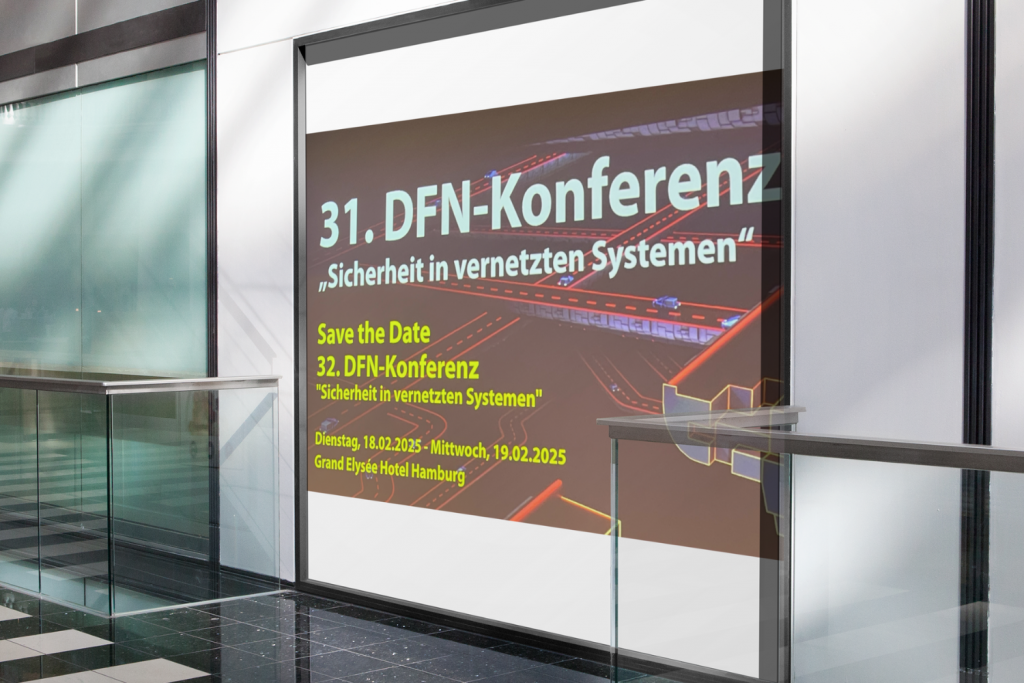
This year’s DFN conference took place in Hamburg on 30 and 31 January 2024. We were there.
Parliamentary Evening at the Berliner Museum für Kommunikation

On October 12, the exhibition “#Krisenalltag – Kommunikation in der Pandemie” (#Daily crisis business – communication during the pandemic), to which mecom contributed, ended with a Parliamentary Evening. How does risk communication succeed in times of crisis? Since July, an exhibition at the Museum für Kommunikation Berlin (Berlin Museum of Communication), to which we contributed together with other members of project MIRKKOMM, had been dedicated to this topic. On October 12, the program accompanying the exhibition ended with a Parliamentary Evening in the impressive atrium of the Museum of Communication. Gudrun Menze, one of our colleagues involved in the preparation of the exhibition, was present on site. The Parliamentary Evening was organized by the German Committee for Disaster Risk Reduction e.V. (DKKV) and the German Federal Institute for Risk Assessment (BfR) in cooperation with the Federal Office for Civil Protection and Disaster Assistance (BBK). Together, they had set up an inspiring and entertaining evening. Our highlight was a very amusing piece of impro theater on the topic of disaster management, in which the actors spontaneously “invented” the scenes upon prompts from the audience. In addition, the DKKV’s sponsorship prize was awarded, and Petra Weber, head of the resilience center in the South German district Ostalbkreis, gave impulses on the topic of “Regional resilience”. Welcoming addresses were given by Anja Schaluschke (Director of the Museum for Communication), Andreas Hensel (President of the German Federal Institute for Risk Assessment), Leon Eckert (Chairman of DKKV) and Ralph Tiesler (#BBK President). The all-around successful evening ended with lots of networking and exchange. Our thanks go to the organizers for the great conclusion to the exhibition “#Daily crisis business – communication during the pandemic”.
mecom new member of Cyber Security Cluster Bonn e.V.

Around 100 members from the segments business, science and politics contribute to the Cyber Security Cluster Bonn e.V. As of late, we also belong to the association. Cyber Security Cluster Bonn serves to promote and network science, research and education, business, authorities and public institutions. The association brings together cumulative cyber security knowledge, years of expertise, comprehensive know-how and high-end technology. The result is an innovative IT security cluster, in which business, politics and research combine their unique competencies in an optimal manner. Cyber Security Cluster Bonn was developed from one out of 300 project ideas created within the scope of the Initiative Digitales Bonn (Digital Bonn Initiative). The association was founded in 2018. Alongside around 100 other members from all over Germany, we will contribute to the association with immediate effect. Our core competency is safety-critical communication. Consequently, cyber security is right at the top of our agenda. We look forward to collaborating in the association and to contributing our expertise to the joint development of cyber security with other important players.
Nationwide Alert Day 2023: Modular Warning System (MoWaS) successfully triggered trial alert
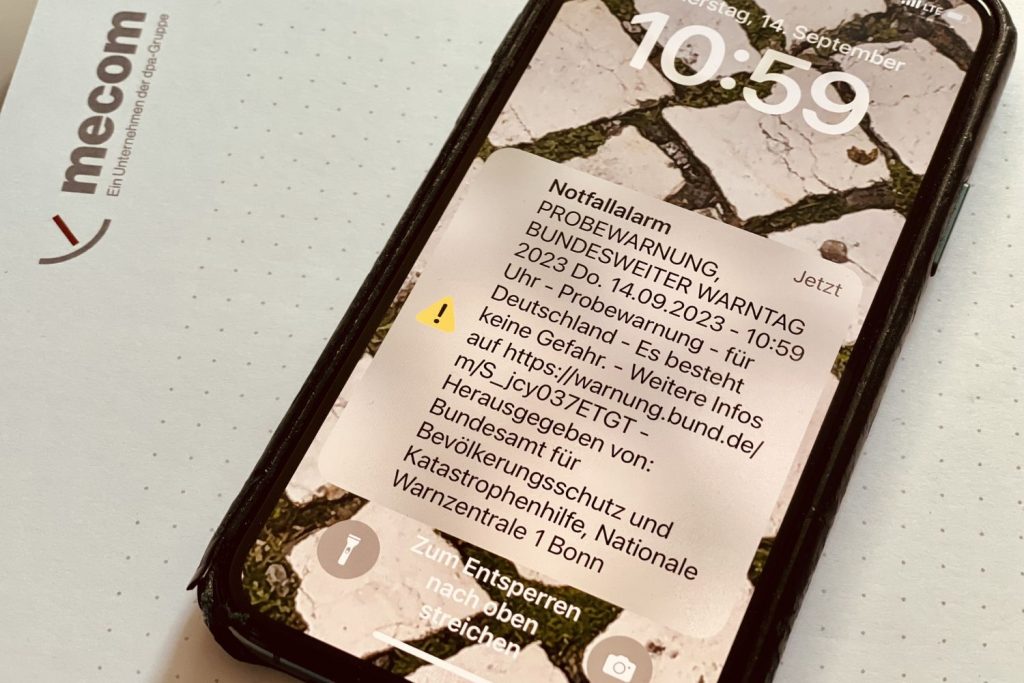
Hamburg. The Nationwide Alert Day 2023 took place throughout Germany today.[A1] A test alert was triggered at 11 a.m. and transmitted on all warning channels in the country. The annual Nationwide Alert Day serves to draw public attention in Germany to information and warning channels in the event of natural disasters, terrorism and cyber- or armed attacks. On this day, the federal government, the federal states and numerous local authorities, municipalities and cities test the function and connection of all relevant alert multipliers and alert systems. The main focus of the Alert Day is the Modular Warning System (MoWaS), which mecom Medien-Communikations-Gesellschaft mbH developed and has been operating for the Federal Republic of Germany since 2001 on behalf of the Federal Office of Civil Protection and Disaster Assistance (BBK). MoWaS is used nationwide by connected alert stations as a central message hub for issuing official public alerts. “From our point of view, the Nationwide Alert Day was very successful again this year,“ said Alexander Feldmann, Managing Director of mecom. “Our entire technical infrastructure surrounding the Modular Warning System worked reliably as expected. We are pleased that we were able to contribute significantly to the success of the Alert Day for all partners involved.“ The nationwide stress test of the alert system was preceded by months of preparation at mecom. Mandy Best, who manages the company together with Alexander Feldmann, added: “Our entire team works continuously and intensively to ensure that the Modular Warning System functions smoothly around the clock, 365 days a year, so that people in Germany can be warned of dangers promptly at all times. We are proud that we have been successfully carrying out this responsible project together with the BBK and other partners for more than 20 years and are constantly developing it further.“ About the Alert Day: On the Nationwide Alert Day, the federal and state governments as well as the participating districts, district-free cities and municipalities test their alert equipment in a joint exercise. Participation is voluntary; not all local authorities take part. In the course of the Alert Day, the participating authorities and emergency services activate different alert systems such as radio and television, digital city display boards, the Cell Broadcast system launched in February 2023 or warning apps. The existing alert systems are tested depending on their availability and operational capability. In this way, the technical processes in the event of an alert and also the alert systems themselves can be checked for their proper functioning and possible weaknesses. Afterwards, the responsible authorities carry out improvements, if necessary, to make the public alert system even safer. The Nationwide Alert Day also serves the purpose of informing people in Germany about the public alert system. This enables them to react faster and more effectively in the event of an emergency. About mecom: mecom Medien-Communikations-Gesellschaft mbH (in short: mecom), based in Hamburg, was founded in 1989 and is a joint venture of the news agencies dpa Deutsche Presse-Agentur GmbH, dpa-AFX Wirtschaftsnachrichten GmbH, KNA Katholische Nachrichten-Agentur GmbH, GEP Gemeinschaftswerk der Evangelischen Publizistik gGmbH with epd and AFP Agence France-Presse GmbH. dpa is the largest shareholder with 50 percent of mecom shares. As a modern IT service provider, mecom designs and operates innovative and customised solutions for professional high-security and communication applications. This includes, for example, the reliable transmission of sensitive data via satellite using its own satellite ground stations in the broadcast process or via web technology. About MoWaS: mecom develops and operates the Modular Warning System (MoWaS) for the Federal Republic of Germany. This is a powerful alert and communication system used by the federal government and the federal states to warn and inform the population in the event of civil protection emergencies and disasters. Alert messages are transmitted simultaneously in real time via numerous channels. The system is tamper-proof and resistant to power failures or failures of the terrestrial transmission channels. Contact: mecom Medien-Communikations-Gesellschaft mbH Mittelweg 143 20148 Hamburg E-Mail: mail@mecom.de Telephone: +40 40 4113-32800 www.mecom.de [A1]on September 14
Filmic review of the exhibition opening at the Berliner Museum für Kommunikation
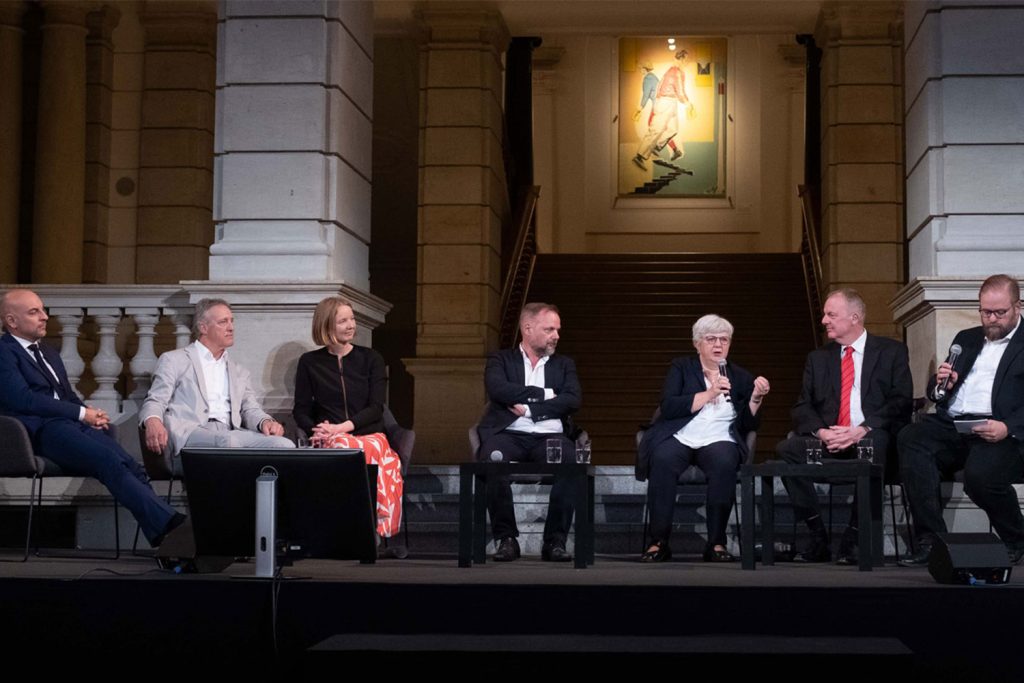
Two weeks ago, we attended a vernissage in Berlin at the Museum für Kommunikation (Berlin Museum of Communication). Since 13 July, the exhibition “#Krisenalltag – Kommunikation in der Pandemie” (#Daily crisis business – communication during the pandemic), to which we contributed in terms of organization and content, has been running there. The exhibition shows initial research results of project MIRKKOMM on pandemic communication. We are a practice partner in this research project sponsored by the Federal Ministry of Education and Research (BMBF). Since the fall of 2022, we have been examining the risk and crisis communication of the federal government, states and municipalities during the corona pandemic together with other players, such as the German Federal Institute for Risk Assessment (BfR), Technische Universität Ilmenau or Europa-Universität Viadrina. In a short video, we got the protagonists of the project in front of the camera and captured their impressions of the exhibition. For their statements we thank Dr. Annett Schulze (BfR), Prof. Dr. Michael Beuthner (SRH Berlin University of Applied Sciences), Prof. Dr. Martin Löffelholz (TU Ilmenau), Prof. Dr. Hans-Jürgen Bucher (Karlsruher Institut für Technologie KIT), Dr. Robert Frau (Europa-Universität Viadrina) and our colleague Gudrun Menze.
mecom co-organises exhibition on pandemic communication at the Museum für Kommunikation Berlin/ Opening on 13 July 2023
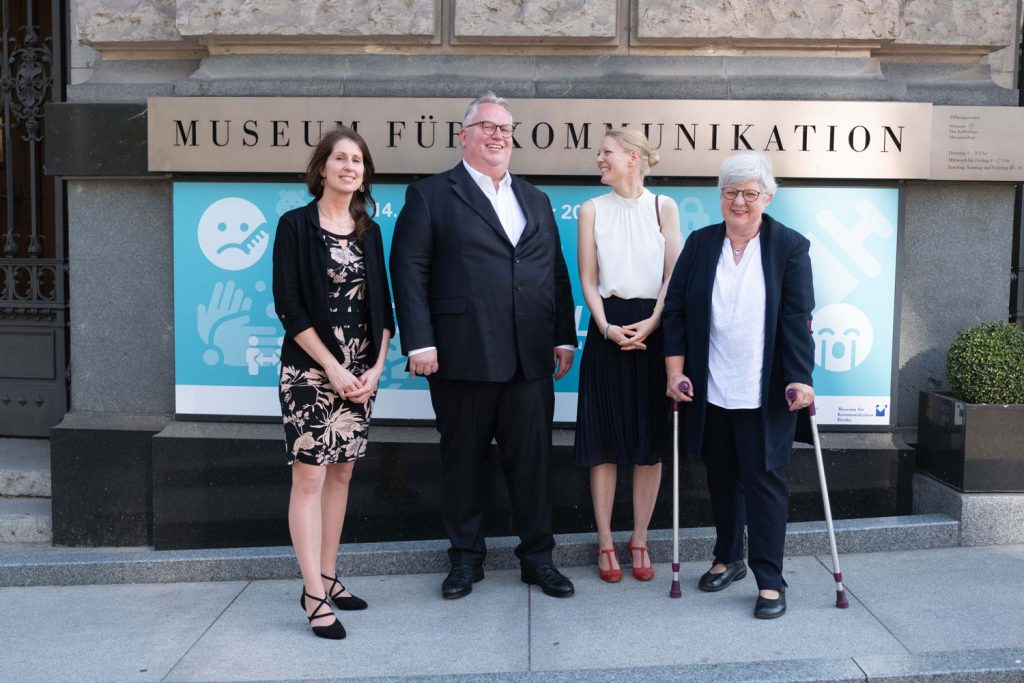
Berlin. “#Krisenalltag – Kommunikation in der Pandemie” (#Daily crisis business – communication during the pandemic) is the title of a temporary exhibition that will open on 13 July 2023 at the Museum für Kommunikation Berlin (Berlin Museum of Communication). mecom contributes content to and is involved in the organisation of this event. As a practice partner, mecom participates in a project on pandemic communication with the German Federal Institute for Risk Assessment (BfR), and initial research results from this project will be presented in the exhibition. The joint project “Optimierung der Risiko- und Krisenkommunikation von Regierungen, Behörden und Organisationen der Gesundheitssicherung” (MIRKKOMM) is sponsored by the Federal Ministry of Education and Research (BMBF) and has, since the autumn of 2021, been examining the risk and crisis communication of the federal government, states, municipalities, media and new public actors during the corona pandemic. Since mecom acts as a practice partner in project MIRKKOMM, it also plays a significant role in the exhibition on corona communication. Until October 2023, visitors will have the opportunity to look into the digital communication strategies of authorities, the media and influencers and get insights into the communicative dynamics of a pandemic. “We are very pleased to contribute to a project as important as MIRKKOMM and the accompanying public exhibition for the Federal Republic of Germany, together with the BfR, the Federal Office for Civil Protection and Disaster Assistance (BBK) and further high-level institutions such as SHR Berlin University of Applied Sciences, Technische Universität Ilmenau, Karlsruher Institut für Technologie and Europa-Universität Viadrina,” states Mandy Best, Managing Director at mecom. “The Modular Warning System (MoWaS) plays a crucial role in MIRKKOMM and hence also in the exhibition,” says Alexander Feldmann, Managing Director at mecom. “MoWaS, which we are developing and operating for the BBK, generates and disseminates official public alerts and is, especially in times of crisis, an important instrument to alert the population in a quick, transparent and appropriate manner. Therefore, we are running a usability study to investigate how MoWaS can be optimised for users. Together with our project partners, we will present the first findings in the exhibition at the Museum of Communication, and demonstrate how MoWaS was utilised during the pandemic.” The exhibition “#Daily crisis business – communication during the pandemic” takes visitors on an interactive journey through the time of the COVID-19 pandemic and revisits the past three years. Guests can experience the communication surrounding the pandemic with the help of wall screens, a multitouch table and an interactive projection. The exhibition will open at the Museum of Communication on 13 July with a vernissage. Guests include experts from the fields of science and practice as well as representatives of the Federal Ministry of Education and Research. BfR President Prof. Dr. Dr. Andreas Hensel will give a welcoming address. The exhibition will be open to the public until 15 October. Afterwards, it will also be shown in Frankfurt am Main, where it will be on display from 9 November 2023 until March of 2024. About mecom: mecom Medien-Communikations-Gesellschaft mbH (mecom for short) with headquarters in Hamburg was founded in 1989 and is a joint venture of the news agencies dpa Deutsche Presse-Agentur GmbH, dpa-AFX Wirtschaftsnachrichten GmbH, KNA Katholische Nachrichten-Agentur GmbH, GEP Gemeinschaftswerk der Evangelischen Publizistik gGmbH with epd and AFP Agence France-Presse GmbH. dpa is the major shareholder and holds a 50 per cent stake in mecom. As a modern IT services provider, mecom designs and operates innovative and customised solutions for professional communication applications. This includes, in particular, the reliable transmission of sensitive data via satellite in broadcast mode or via web technology. About MoWaS: mecom develops and operates the Modular Warning System (MoWaS) for the Federal Republic of Germany. This is a powerful warning and communication system used by the federal and state governments as well as municipalities to alert and inform the public. The alerts are transmitted via satellite. As opposed to land-based transmission methods such as VHF or mobile communication, satellite communications are less sensitive to interference such as power outages. Contact: mecom Medien-Communikations-Gesellschaft mbH Mittelweg 143 20148 Hamburg Germany Email: mail@mecom.de Phone: +40 40 4113-32800 www.mecom.de Further information on the exhibition: https://mirkkomm.de/wordpress/?page_id=1027
mecom co-organises exhibition on pandemic communication at the Museum für Kommunikation Berlin/ Opening on 13 July 2023
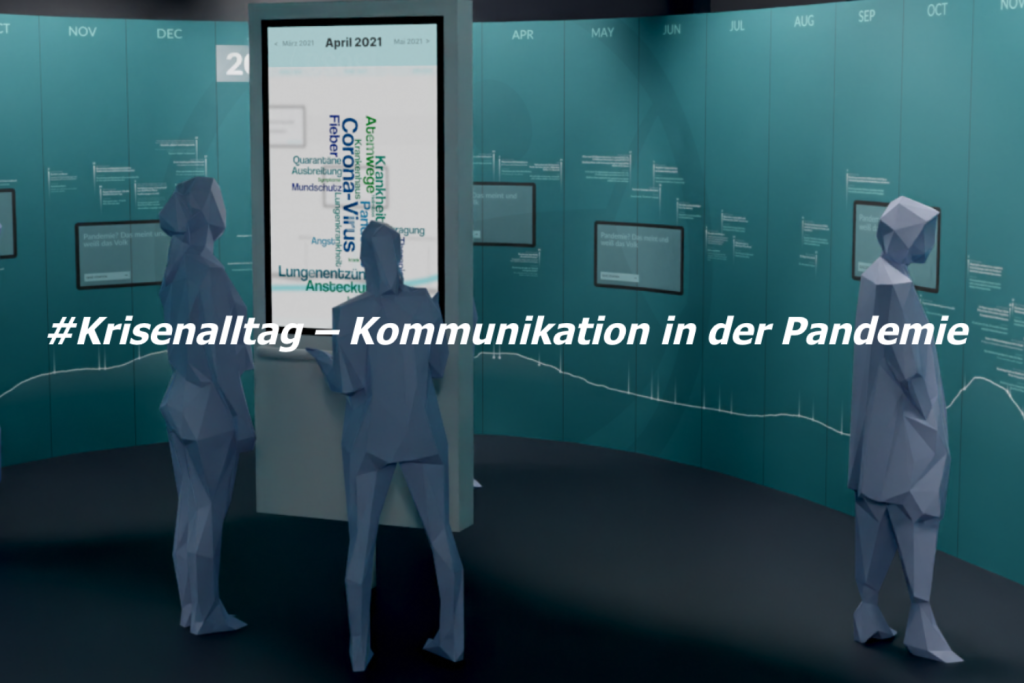
Berlin. “#Krisenalltag – Kommunikation in der Pandemie” (#Daily crisis business – communication during the pandemic) is the title of a temporary exhibition that will open on 13 July 2023 at the Museum für Kommunikation Berlin (Berlin Museum of Communication). mecom contributes content to and is involved in the organisation of this event. As a practice partner, mecom participates in a project on pandemic communication with the German Federal Institute for Risk Assessment (BfR), and initial research results from this project will be presented in the exhibition. The joint project “Optimierung der Risiko- und Krisenkommunikation von Regierungen, Behörden und Organisationen der Gesundheitssicherung” (MIRKKOMM) is sponsored by the Federal Ministry of Education and Research (BMBF) and has, since the autumn of 2021, been examining the risk and crisis communication of the federal government, states, municipalities, media and new public actors during the corona pandemic. Since mecom acts as a practice partner in project MIRKKOMM, it also plays a significant role in the exhibition on corona communication. Until October 2023, visitors will have the opportunity to look into the digital communication strategies of authorities, the media and influencers and get insights into the communicative dynamics of a pandemic. “We are very pleased to contribute to a project as important as MIRKKOMM and the accompanying public exhibition for the Federal Republic of Germany, together with the BfR, the Federal Office for Civil Protection and Disaster Assistance (BBK) and further high-level institutions such as SHR Berlin University of Applied Sciences, Technische Universität Ilmenau, Karlsruher Institut für Technologie and Europa-Universität Viadrina,” states Mandy Best, Managing Director at mecom. “The Modular Warning System (MoWaS) plays a crucial role in MIRKKOMM and hence also in the exhibition,” says Alexander Feldmann, Managing Director at mecom. “MoWaS, which we are developing and operating for the BBK, generates and disseminates official public alerts and is, especially in times of crisis, an important instrument to alert the population in a quick, transparent and appropriate manner. Therefore, we are running a usability study to investigate how MoWaS can be optimised for users. Together with our project partners, we will present the first findings in the exhibition at the Museum of Communication, and demonstrate how MoWaS was utilised during the pandemic.” The exhibition “#Daily crisis business – communication during the pandemic” takes visitors on an interactive journey through the time of the COVID-19 pandemic and revisits the past three years. Guests can experience the communication surrounding the pandemic with the help of wall screens, a multitouch table and an interactive projection. The exhibition will open at the Museum of Communication on 13 July with a vernissage. Guests include experts from the fields of science and practice as well as representatives of the Federal Ministry of Education and Research. BfR President Prof. Dr. Dr. Andreas Hensel will give a welcoming address. The exhibition will be open to the public until 15 October. Afterwards, it will also be shown in Frankfurt am Main, where it will be on display from 9 November 2023 until March of 2024. About mecom: mecom Medien-Communikations-Gesellschaft mbH (mecom for short) with headquarters in Hamburg was founded in 1989 and is a joint venture of the news agencies dpa Deutsche Presse-Agentur GmbH, dpa-AFX Wirtschaftsnachrichten GmbH, KNA Katholische Nachrichten-Agentur GmbH, GEP Gemeinschaftswerk der Evangelischen Publizistik gGmbH with epd and AFP Agence France-Presse GmbH. dpa is the major shareholder and holds a 50 per cent stake in mecom. As a modern IT services provider, mecom designs and operates innovative and customised solutions for professional communication applications. This includes, in particular, the reliable transmission of sensitive data via satellite in broadcast mode or via web technology. About MoWaS: mecom develops and operates the Modular Warning System (MoWaS) for the Federal Republic of Germany. This is a powerful warning and communication system used by the federal and state governments as well as municipalities to alert and inform the public. The alerts are transmitted via satellite. As opposed to land-based transmission methods such as VHF or mobile communication, satellite communications are less sensitive to interference such as power outages. Contact: mecom Medien-Communikations-Gesellschaft mbH Mittelweg 143 20148 Hamburg Germany Email: mail@mecom.de Phone: +40 40 4113-32800 www.mecom.de Further information on the exhibition: https://mirkkomm.de/wordpress/?page_id=1027










